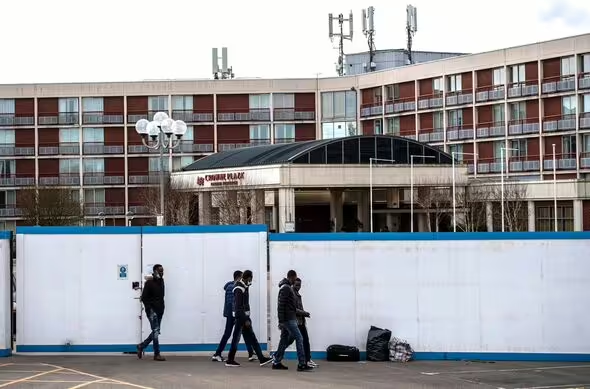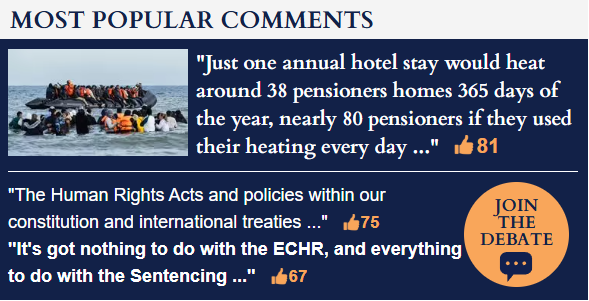“The Home Office is grappling with soaring, ‘cripplingly expensive’ costs for temporary asylum seeker housing, driven by a sharp rise in small boat arrivals.”

Bombshell research has revealed that housing a single asylum seeker in a hotel costs taxpayers over £54,000 a year. With a sharp rise in small boat crossings, the Home Office is under mounting pressure as it faces “cripplingly expensive” accommodation bills. In response, the Chartered Institute of Housing (CIH) is urging ministers to rethink the approach—calling for one-off grants to councils to purchase homes for migrants. According to the CIH, allowing people to share housing would slash costs significantly and ease the burden on the taxpayer.

Presenting a clear economic case, the Chartered Institute of Housing (CIH) told the Home Affairs Select Committee that the average annual cost of placing one person in hotel accommodation stands at £54,020. In stark contrast, the CIH highlighted that housing three people in a three-bedroom home could save the government approximately £150,395 a year—simply by swapping hotel bills for standard rent aligned with local housing allowance rates.
Controversy Grows Over Migrant Housing Proposal Amid UK Housing Crisis
A bold plan to move asylum seekers out of hotels and into homes is facing sharp backlash, as fresh figures expose the staggering cost of temporary accommodation and concerns mount over fairness during a national housing crisis.
According to evidence presented to the Home Affairs Select Committee, the Chartered Institute of Housing (CIH) revealed that the average cost per person for hotel accommodation is £54,020 per year. In contrast, the CIH estimates that housing three people in a standard three-bedroom home could save £150,395 annually, based on local housing allowance rates.
While the CIH argues that this shift could dramatically reduce the burden on taxpayers, the proposal has sparked intense debate.
The Local Government Association warned that an already “acute shortage of housing” combined with rising demand could lead to increased prices, making it even harder for families to find homes.
Conservative MP Neil O’Brien, a long-standing critic of high immigration levels, linked the crisis directly to illegal Channel crossings.
“With illegal crossings on the small boats up by a quarter under Starmer, local communities are struggling under the pressure,” he said.
“Migration on this scale obviously makes it more difficult for people to get housing… British people will feel it is unfair that people who have just arrived should get housed while those who’ve worked and paid in for years lose out.”
Reform UK MP Lee Anderson went further, describing the proposal as
“a slap to the face of young people in Britain working hard and saving to get on the housing ladder,”
and called for tougher action:
“By detaining and deporting all those who arrive illegally, we can drastically reduce the need for asylum accommodation altogether, end the use of hotels, and save taxpayers millions.”
Meanwhile, the CIH criticized the Home Office’s response to the hotel crisis as “too slow.”
“When we first made these calculations in summer 2023, 48,000 asylum seekers were staying in hotels. We estimated that 16,000 homes would have been needed to replace them entirely,” the institute said.
“If we had begun procuring homes then, each home would already have repaid the capital grant needed for its purchase—and would now be saving over £150,000 annually.”
The CIH noted that as asylum claim processing has accelerated, the number of people housed in hotels had dropped to just under 36,000 as of September 2024. However, they argue that faster action and a more strategic long-term solution could have already saved hundreds of millions.
Migrant Hotel Costs Soar as Critics Slam Missed Opportunity to Save Millions
New figures have revealed the eye-watering cost of housing asylum seekers in hotel accommodation, intensifying calls for urgent reform of the UK’s asylum housing system. The Chartered Institute of Housing (CIH) has issued a stark warning, saying the Home Office missed a major opportunity to curb spiraling expenses by failing to act sooner.
According to the CIH, if 16,000 homes had been purchased in 2023, as they had recommended, at least 12,000 of those properties would still be actively used within the asylum system today—each saving significant public funds.
The CIH reiterated that relying on hotels is “cripplingly expensive”, not only for the Home Office but for local councils too. Local authorities are currently spending £1.7 billion annually on temporary accommodation, worsening the pressure on already-stretched budgets.
The scale of the issue is staggering:
- More than 38,000 migrants are currently housed in hotels, at a daily cost of £5.5 million to the taxpayer.
- An additional 65,707 asylum seekers are accommodated in other forms of housing.
- The cost of a hotel room? £145 per night.
- The cost of alternative accommodation, such as bedsits, flats, or houses? Just £14 per night, according to the National Audit Office.
The financial contrast couldn’t be starker. Critics say that with proper planning, the government could have dramatically reduced expenditure by transitioning migrants into more sustainable, community-based housing solutions.
As the number of asylum seekers placed in hotels continues to slowly decline—down to just under 36,000 in September 2024—the debate over how to house them fairly and affordably is far from over.

CIH Defends Plan as Cost-Saving and Future-Proof
Defending the proposal, John Perry, policy advisor at the Chartered Institute of Housing (CIH), pushed back against criticism, arguing that the plan offers both immediate savings and long-term benefits.
“This government (like the previous one) is keen to cut the costs of accommodating asylum seekers,” Perry said.
“Buying houses to do this would be cheaper than using hotels. If local authorities bought the houses, they could later be used for homeless families once the current backlog of asylum cases has been cleared – which the government is already working on.”
He stressed that the shift would not only reduce current spending but would also address the wider housing crisis:
“This move would save money and – very soon – provide better accommodation for families who are homeless, many of whom are currently living in hotels.”
Perry’s remarks come as a counterpoint to critics who argue that prioritising housing for migrants is unfair to British families. The CIH insists the proposal is a long-term investment, offering a dual solution to both the asylum and homelessness crises.
Starmer: “I’m Determined to Bring the Hotel Bill Down”
Labour leader Sir Keir Starmer addressed growing concerns over the cost of asylum hotels and foreign aid, stating his firm commitment to reducing the financial burden on taxpayers.
“I’m absolutely determined to get the hotel bill down—wherever it falls. And it shouldn’t be falling where it falls at the moment,” Starmer said, referencing the unsustainable cost of accommodating asylum seekers in hotels.
While cautious about making firm promises on aid spending, he indicated a clear direction of travel for a future Labour government:
“I’m not going to make a commitment to what pathway we’re going to take to get aid spending back up again, but that’s what I’m going to tell you… that is where we want to get back to.”
He added that action can’t be delayed:
“I don’t want to wait until we get to that point—I want to act now to find other ways of doing what we want to do on aid.”
Starmer’s comments signal a pragmatic but forward-looking stance, balancing fiscal responsibility with humanitarian goals.